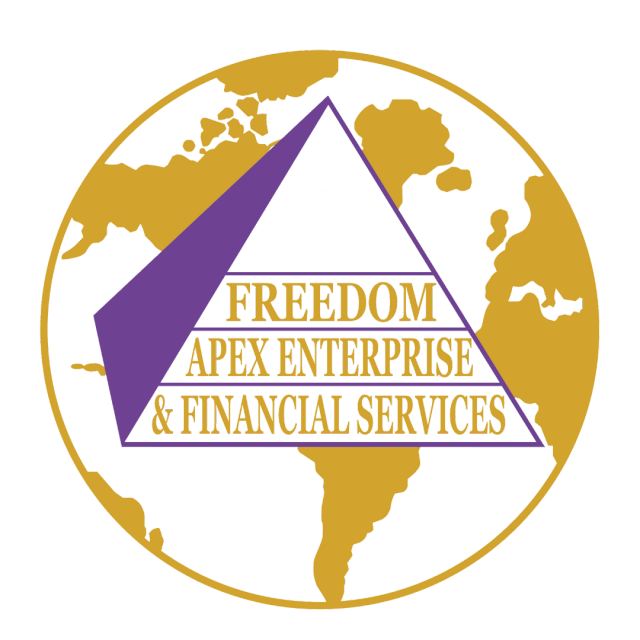|
Estate Planning

Freedom Apex Enterprise & Financial Services
"Speed Breeds Success"
"Where Building Is Helping You Win"

ESTATE PLANNING BASICS Part 1
Why do Estate Planning?
Dying Intestate:
We need to do estate planning to avoid dying "intestate". Dying intestate means dying without having created either a will or a trust which provides instructions for passing your estate on to your heirs. Dying intestate is like taking your property and attempting to throw it to your heirs on the other side of a deep chasm, a chasm which is filled with hazards. These hazards (probate, creditors, con-artists, lawsuits, judgments, lawyers, and death taxes) can damage much of the value of your estate and allow your property to go to unintended heirs and in unintended ways.
All property owners have done some estate planning for the distribution of their estate to their heirs whether they are aware of it or not. Without a will or a trust the inheritance laws (laws of intestacy) of your state will determine how your property will pass to your heirs. If you have no heirs that fit the state's formula, the assets will be taken by the state. Often times the state's formula and rules for moving assets to your heirs will not be what you would have chosen if you had done some planning.
One of the best ways to get your estate over the intestate chasm is to build a bridge to your heirs, otherwise known as a trust. This provides for the estate to be taken safely over the financial risks which are posed by probate, creditors, con-artists, lawsuits, judgments, lawyers, and death taxes. Let's evaluate some of these financial risks to better understand how and why to avoid them.
Problems
Problems With Probate:
If you die with any property titled in your personal name, there must be a probate process for that property (assuming the estate is above a minimal size). Probate is the state's legal procedure for handling three major functions for your estate. (1) A final and definite identification of and appropriate payment to the estate’s legitimate creditors and claimants, (2) Identification of the rightful heirs to the estate and the share size that each heir will receive, and (3) getting the legal title of the property out of your name and into the name of the heirs. Having a will drawn up in advance of your death will take care of the second function, identification of the rightful heirs and their share. With no valid will for your estate the state will use its own formula for determining heirs and their share. But even with a will, the creditor/claimant identification and the re-titling of your property still must be handled through a court administered probate procedure. When an estate owner dies the only way that their property can be legally re-titled in the heirs' names is by a court order in a court supervised process, or probate.

Avoiding probate is desirable because it can be a time consuming and expensive process. Reliable estimates are that on a national average probate costs run from 4% to 10% of the value of the estate. This means that an estate worth only $200,000 could cost $8,000 to $20,000 to probate. These costs are based on the fair market value of the property, and not on just the net worth or equity. In other words, an estate with debt against it will cost the same to probate as one without debt. In some cases probate ends up in litigation that drags on for years. Probate encourages creditors and claimants to appear who might not otherwise, whose claims may be inaccurate or fraudulent but only the deceased estate owner would be able prove otherwise. Probate frequently leads to family battles, and it often causes or allows the decedent's wishes to be ignored. In addition, probate procedures are made public, causing family privacy to be lost.
One good way to avoid probate is through the use of a family estate planning trust, either a living trust or a life estate trust. Think of the trust as a bridge that will allow a trustee to move your assets safely across the intestacy and probate chasm to your heirs on the other side. The way a trust avoids probate is by titling your property in the name of the trust before your death. You retain complete control of the property during your life, but the trust is considered to be the legal owner of the property for title transfer purposes. Upon your death a trustee that you pre-selected will simply handle the transfers or payments to your heirs which you specified in the trust. You have a great deal of flexibility in specifying the details of these payments and transfers (see the "Estate Transfer & Heir Planning" topic below). After your death the trustee can handle everything quickly and simply without lawyers, court supervision, excessive costs or delays.
Real Estate Provider #515.000066/Fahim Muhammad Instructor #512.003026/Fahim Muhammad Managing Broker #471.020985 Freedom Financial Institute, IDOI Provider #500026517/NMLS Provider #1405073/Fahim Muhammad NMLS #1851084 All loans originated through Mortgage Loan Direct, NMLS #1192858 15255 South 94th Avenue, Suite 500 Orland Park, IL 60462. Freedom Apex Enterprise & Financial Services Mailing Address: 837 East 162nd Street, Suite 7-8 South Holland, IL 60473 708-704-7309/708-566-1222, 844-49-FREEDOM
FINRA Broker Check
Disclaimer and Release Nothing contained on this website constitutes tax, legal, insurance or investment advice, or the recommendation of or an offer to sell, or the solicitation of an offer to buy or invest in any investment product, vehicle, service or instrument. The information shared is hypothetical and for informational and educational purposes only. Such an offer or solicitation may only be made and discussed by a registered representative of a broker dealer or investment advisor representative of an investment advising firm. You should note that the information and materials are provided "as is" without any express or implied warranties. Past performance is not a guarantee of future results. All investments involve a degree of risk, including a degree of loss. No part of FTAMG’s materials may be reproduced in any form, or referred to in any other publication, without express written permission from FTAMG and or its affiliates. Links to appearances and articles by Fahim Muhammad, The Freedom Coach, whether in the press, on television or otherwise, are provided for informational and educational purposes only and in no way should be considered a recommendation of any particular investment product, vehicle, service or instrument or the rendering of investment advice, which must always be evaluated by a prospective investor in consultation with his or her own financial adviser and in light of his or her own circumstances, including the investor's investment horizon, appetite for risk, and ability to withstand a potential loss of some or all of an investment's value. By using this website, you acknowledge that you have read and understand the foregoing disclaimers and release FTAMG and its affiliates, members, officers, employees and agents from any and all liability whatsoever relating to your use of this site, any such links, or any information contained herein or in any such appearances or articles (whether accessed through such links or downloaded directly from this website). FTAMG highly encourages its viewers and potential clients to obtain the independent advice and services of legal, financial, and tax professionals.
Securities offered through The Leaders Group, Inc. member FINRA/SIPC 475 Springfield Avenue, Suite 1, Summit, NJ 07901 (303) 797-9080
info@freedomfinancialinstitute.orgCopyright© 2025 - Fahim Muhammad Freedom Financial Institute, Inc.

|
|
|